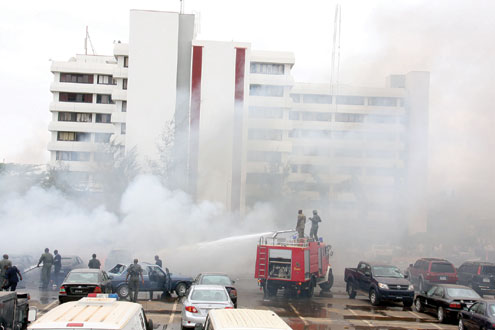On the 16th of June, 2011, a powerful car bomb exploded at the headquarters of the Nigeria police. At least five people were reported dead, including the driver of the vehicle, while dozens of vehicles were incinerated inside the parking lot at the Louis Edet House. At first a suicide bomber was said to have detonated the bomb and that account seemed to have found credibility, when the Islamist group known as BOKO HARAM claimed responsibility. The group stated that it had targeted the Inspector General of Police, Hafiz Ringim, for his boast a few days earlier, to end the menace of BOKO HARAM attacks in the country.
In the heat of the bombing, contradictory statements were issued by the authorities, which indicated that there were deep-seated levels of confusion in the nation’s security system. It should not be lost on everybody, that the attack on the police headquarters was not just the first such attack on the nerve center of the nation’s security system, but a personal humiliation for the IGP, Ringim. That he did not choose to resign and was not fired by government underlined the inability of top people in the Nigerian system to take responsibility for their positions.
What should worry Nigerians more is the apparent level of incompetence in the nation’s security system and the fact that crimes seem to be committed without the security services having the capacity to prevent them or ensuring that culprits are brought to justice in many instances of crime in Nigeria. The predatory attitude of the security system in its relationship with the citizenry has also made it difficult for the nation’s security structure to build the level of rapport with citizens that can assist the effort to secure the country. The deepening problems of poverty and the inability of the state to create the enabling environment for jobs have also alienated citizens thus providing an ambience for the breakdown of security in the country.
The proliferation of non-state, anti-state groups around the country is a direct consequence of the uncaring society that we have systematically instituted in recent years where the tiny stratum of rich has grown richer, just as the majority is sinking into poverty and hopelessness. It is therefore no surprise that the more hopeless the situation has become for the mass of Nigerians, the more insecure the nation has also become. It might be argued that we need to improve the capacity of our security institution to help secure the country, but there can be no greater level of security than a contented people able to guarantee basic existential needs within the ambience of a caring society as well as a responsive and responsible ruling elite. If we do not begin to put in place the building blocks of such a society, we need no soothsayers to remind us that we will face even more dangerous assaults to the nation’s security infrastructure into the future.


